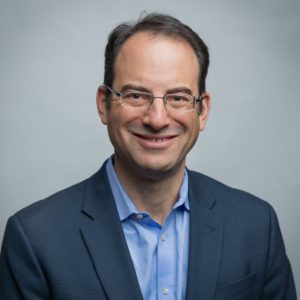
Both major political parties are targeting Colorado’s attorney general race as a must-win election. With 35 state attorneys general offices in play across the country this November, Democrats nationally are eyeing several possible pick-ups from a list that includes states such as Florida, Ohio, Michigan, Wisconsin, and Colorado, where Republicans have controlled the top lawyer post since 2005.
After a hard-fought primary on the Democratic side of the ticket, candidate Phil Weiser edged out Rep. Joe Salazar in the June 26 primary by about 5,000 votes. Weiser served as deputy assistant attorney general in the U.S. Department of Justice during the Obama administration and spent five years as dean of the University of Colorado Law School. Weiser outraised Salazar by more than $1.3 million in campaign cash, and also received an endorsement from Gov. John Hickenlooper. Salazar’s key endorsement was from Vermont Sen. Bernie Sanders.
Republican candidate and 18th Judicial District Attorney George Brauchler ran unopposed in the June 26 primary.
“We know there is energy in Colorado to see the Office of Attorney General swing back to blue — and we know that Weiser will work tirelessly to protect the people of Colorado and put their needs first,” said Sean Rankin, executive director of the Democratic Attorneys General Association, in a July 2 endorsement of Weiser. Calling Democratic attorneys general “the last line of defense,” Rankin added, “The role of state attorneys general has never been more important. Voters need leaders they can trust to hold those in power accountable, protect their rights, and ensure the law is applied fairly.”
In May, DAGA commissioned Clarity Campaign Labs to conduct a poll of likely general election voters; the results of the 833 respondents, reached via landlines and cell phones, showed Weiser with a 12-point lead over Brauchler. (The poll cited a margin of error of about 3 percent.) Weiser also pointed to what he identified as an “enthusiasm gap” in the primary turnout; voters cast about 135,000 more ballots in the Democratic primary than in Republican races. “The Republicans will try to overcome [that gap] with cynical politics,” Weiser said. “I want to elevate people’s understanding of this job.”
Scott Will, executive director of the Republican Attorneys General Association, said he’s not concerned about a so-called “enthusiasm gap” and described the contest between Weiser and Brauchler as “the type of experience match-up that we at RAGA dream of.” According to Will, RAGA has raised close to $30 million this cycle. Will cited the Colorado AG race as “near the top of the list in terms or priorities” for RAGA but declined to cite a specific dollar amount the group might commit to the race. Will did note that in 2014, RAGA spent about $2.5 million on Republican Cynthia Coffman’s successful attorney general campaign. “George has been prosecuting violent criminals for years,” Will said. “Weiser’s real claim to fame is serving as dean.”
Brauchler said significant spending on the primary race for governor — nearly $25 million across both parties, a state record even before the general election campaign began in earnest —likely contributed to the disparity in the vote total between Democrats and Republicans. “When you have that many dollars out there,” Brauchler said, “I think you’re going to see a natural uptick.” The Republican candidate added he also thought Hickenlooper’s endorsement had a significant impact on the primary result. “If we’re being honest,” Brauchler said, “nobody saw this election turning out for Phil until Hickenlooper showed up.”
Now that Weiser is the nominee, both Brauchler and RAGA are focused on framing the race as contest over who has more experience, specifically in the courtroom. “What qualifications and experience do you bring to this massive job? And what things do you have in mind to do once you’re there?” Brauchler said. “Those two things have to be linked; all the great ideas in the world aren’t going to amount to much without the experience to put them into place.”
Brauchler touts his experience running a district attorney’s office and his role as a legal advisor in the Colorado Army National Guard: “There is very little in a courtroom or in the law that I don’t have some experience or familiarity with.” Two weeks ago, Brauchler attacked Weiser on Twitter for his lack of courtroom experience.

For his part, Weiser said: “George is going to be George. He uses inflammatory rhetoric in how he talks about things; I want to bring people together to solve problems, that’s what’s motivates me and where I’m coming from … The challenges we have are not going to be solved through political divisiveness.”
Now that the general election campaign is underway, with a bigger audience to reach, Weiser said his campaign’s message won’t change all that much. Weiser ticked off a list of issues he felt were important and, if elected, would tackle: climate change, defending constitutional rights for the Dreamers, upholding net neutrality, the opioid epidemic, and, generally, providing a check on executive branch overreach. “There’s a lot happening on the national level that’s scary,” Weiser said. “We need Colorado to pull together to defend our way of life.”
— Chris Outcalt

